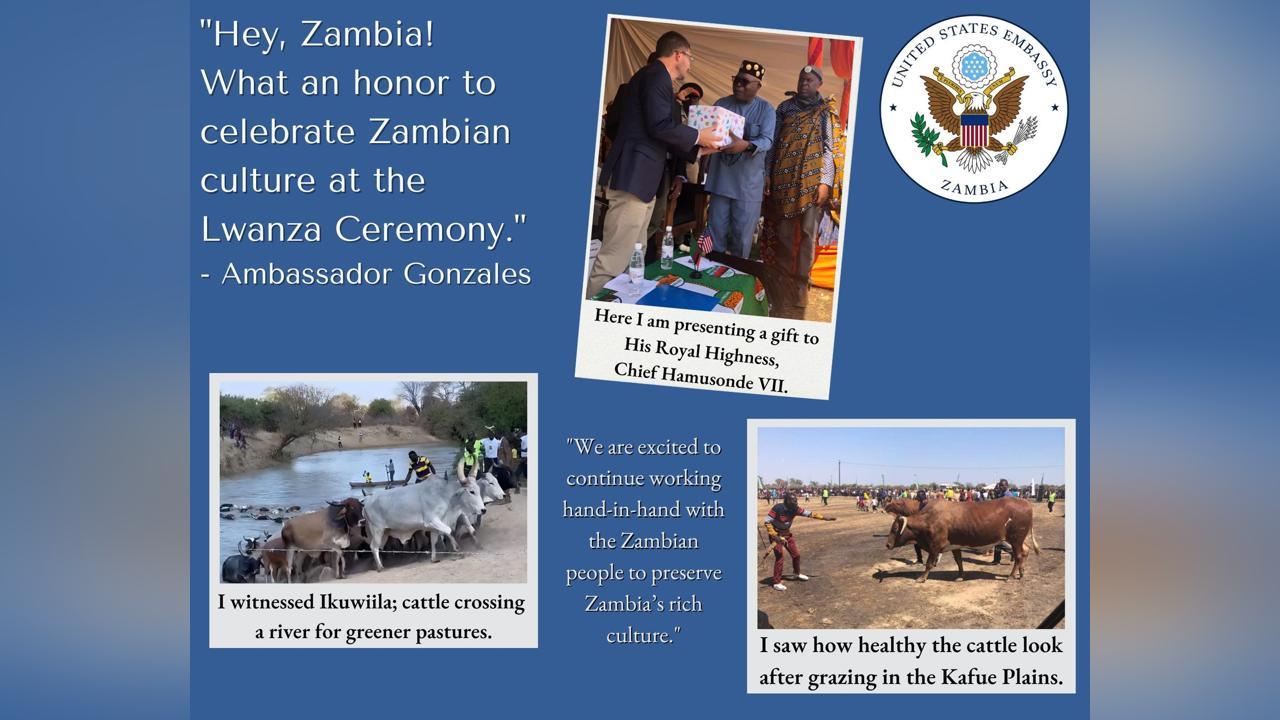Africa-Press – Zambia. The United States government has reaffirmed its commitment to supporting Zambia in the areas of public health and education. Speaking in Bweengwa when he graced the 2023 Lwanza Traditional Ceremony of the Lundwe People of Chief Hamusonde in Monze District, United States Ambassador to Zambia Michael Gonzales said the pattern of engagement over the past two years is proof that the United States is investing in the future the Zambian people aspire to.
Mr. Gonzales said the recent announcement by the U.S. government to contribute over 13 billion kwacha to Zambia’s National HIV response and other investments that span over 20 years amounting over 125 billion kwacha have truly impacted on the lives of every Zambian.
“The U.S. government’s partnership with the Zambia government is poised for greatness, because we invest for the betterment of many lives in the country,” Ambassador Gonzales said.
He said, every three-kwacha spent in Zambia’s healthcare system is provided as a grant from the American people through strong collaboration that has existed and renewed in the past two years adding that the U.S. government will continue partnering with Zambia to improve the quality of health and education.
And, Chief Hamusonde has applauded the government and President Hakainde Hichilema for successfully sealing the deal on debt restructuring. Chief Hamusonde who spoke through a representative, Senior Headman Mwanakampwe, Milner Mwanakampwe, said the achievement presents a window of opportunities for enhanced development.
” I am confident that our Chiefdom will further benefit from the results of this debt restructuring because as Cooperating Partners that had suspended support to our national budget have reportedly resumed their support,” he said.
He said the Chiefdom has developed a 5-year Strategic Plan which responds to the 8th National Development plan to provide the Chiefdom’s focus in developmental matters.
The traditional leader said his Chiefdom is faced with a lot of challenges that range from poor infrastructure, such as roads especially the Monze Niko Road and bridges that link various parts of the Chiefdom to provide access to health and education facilities.
He said the Chiefdom lacks processing industries for meat products considering that the cattle is the mainstay of the economy in the area. “The industries for meat Products, milk and others are important in providing jobs for our people in the chiefdom, particularly the youths, given the abundance of these raw materials that our chiefdom is endowed with,” He said.
Meanwhile, Southern Province Minister Cornelius Mweetwa reaffirmed the government’s commitment to supporting traditional ceremonies as they are an embodiment of cultural expressions as well as a platform to share beliefs and customs.
Mr. Mweetwa said the vision of Government is to transform traditional ceremonies into a strong tourism product that can be able to attract investment and compete favourable with other tourism products.
” We are living in modern times where cultural heritage is no longer a passive phenomenon but rather a viable product that is used to promote different businesses,” he said.
He said what each Chiefdom offers in terms of investment opportunities contributes to the National inventory in the area of culture tourism and Lwanza Traditional Ceremony remains paramount.
At the same function, Minister of Tourism Rodney Sikumba announced that his ministry will work extra hard to safeguard the wildlife that is in the Lonchnivor National Park which is domiciled in Chief Hamusonde’s Chiefdom in Bweengwa.
This is years Lwanza Traditional Ceremony saw a number of companies coming on board to support the successful hosting. The Ceremony is celebrated annually in the month of August to showcase the animal wealth of the Lundwe People as well as paying Homage to the Ancestral Spirits which are believed to live in the Magically Created Lwanza River.
The Lwanza River was created by a magical man only identified as Himbaama to provide water for both animal and human needs which was a scarce commodity over 200 years ago.
For More News And Analysis About Zambia Follow Africa-Press







